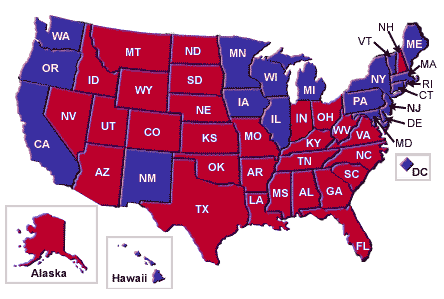The election of 2000 was extremely close, with the Republican presidential ticket of George W. Bush and Dick Cheney winning a tiny majority in the electoral college despite losing the popular vote to the Democrats Al Gore and Joe Lieberman. In the tightest election since 1876, third party candidates prevented either major party candidate from receiving a majority of the popular vote.
For the Democrats, Al Gore hoped to replicated George H.W. Bush's feat in the election of 1988 and convert eight years of service as vice-president into a victory in a presidential contest. The sitting president, Bill Clinton, had been damaged by the Whitewater controversy and his sexual dalliances with Monica Lewinsky. Clinton had survived impeachment, but his support would no longer be an unalloyed advantage to Gore, who kept his distance.
Of the several potential Democratic candidates in 2000, only Senator Bill Bradley of New Jersey, a former basketball player for the NBA New York Knicks and a Rhodes Scholar from Princeton, mounted a serious challenge to Gore. Bradley positioned himself on the liberal side of fence, arguing that the Welfare Reform Act would in fact increase poverty and promised to work for its repeal as president. He also advocate providing tuition support for college students who promised to become teachers.
Although Bradley performed reasonably well in raising money, he was not able to convert this into success in any of the primaries or caucuses. After failing to win any election against Gore, Bradley ended his campaign on March 9, 2000.
At the 2000 Democratic convention, held in Los Angeles in Staples Center in mid August, Gore was nominated for president without opposition, Bradley having released his delegates and instructed them to voe for Gore. Joe Lieberman of Connecticut was given the vice-presidential nod. Gore's acceptance speech concentrated on the future and gave only one mention to President Clinton.
The Republican contest was principally between George W. Bush of Texas and Senator John McCain of Arizona, a former Vietnam War POW. Bush had the blessing of most of the Republican establishment, but was delivered a stinging blow in the New Hampshire primary, which McCain won by 48% to 30% for Bush. One of McCain's key campaign planks was advocacy for campaign finance reform. Politicians generally support this in principle but not practice, so McCain found many of them regarding him with suspicion.
In the South Carolina primary, the tactics used against McCain were particularly distasteful, although Bush naturally disavowed any prior knowledge. Expecting to do well in a Southern state with a large military presence, McCain's loss in South Carolina cost him momentum. Bush continued to win primaries and had the nomination sewn up well before the convention. Alan Keyes and Steve Forbes also made inconsequential appearances on the campaign trail.
At the 2000 Republican national convention, held in Philadelphia from July 30 to August 3, George W. Bush was nominated on the first ballot. He was joined by Dick Cheney, then the Secretary of Defense, as the Republican candidate for vice-president.
The Reform Party, founded and funded originally by Ross Perot, abandoned him in 2000 and nominated Pat Buchanan instead. Perot challenged the results but Buchanan prevailed. However, support for the Reform Party, which had been respectable in 1996, virtually vanished in 2000.
The result of the vote on election day, November 7, 2000, was a virtual tie. It soon became evident that everything depended on the outcome in Florida, where the difference in votes was incredibly close. A recount of some ballots had begun when the United States Supreme Court intervened, forbade any further recount, and declared George W. Bush the winner. This action, in a 5-4 vote and supported primarily by the conservative, Republican-appointed members of the court, tainted the Supreme Court's reputation for impartiality in many minds. In the end, it was decided that Bush won Florida by 537 votes, making the presidential election of 2000 one of the closest in history.
The Green Party candidate Ralph Nader was vilified by many Democrats after the election for drawing just enough votes away from Gore in Florida to permit the Bush victory. Nader maintained that the Democrats and Republicans were simply two version of the same Establishment and that his party represented the only real alternative.
| Election of 2000 Candidates |
Party | Electoral Vote |
Popular Vote |
|---|---|---|---|
| George W. Bush (TX) Dick Cheney (WY) |
Republican | 271 | 50,461,092 |
| Al Gore (TN) Joe Lieberman (CT) |
Democratic | 266 | 50,994,086 |
| Ralph Nader (DC) Winona LaDuke (MN) |
Green | ... | 2,882,728 |
